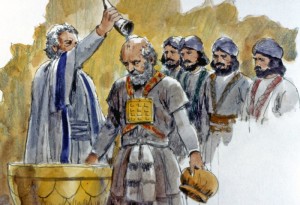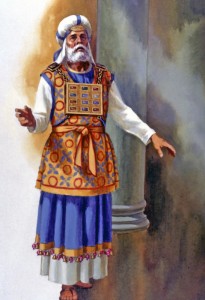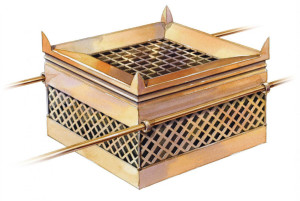 Mark 6
Mark 6
45 Immediately he made his disciples get into the boat and go before him to the other side, to Bethsaida, while he dismissed the crowd. 46 And after he had taken leave of them, he went up on the mountain to pray. 47 And when evening came, the boat was out on the sea, and he was alone on the land. 48 And he saw that they were making headway painfully, for the wind was against them. And about the fourth watch of the night he came to them, walking on the sea. He meant to pass by them, 49 but when they saw him walking on the sea they thought it was a ghost, and cried out, 50 for they all saw him and were terrified. But immediately he spoke to them and said, “Take heart; it is I. Do not be afraid.” 51 And he got into the boat with them, and the wind ceased. And they were utterly astounded, 52 for they did not understand about the loaves, but their hearts were hardened. 53 When they had crossed over, they came to land at Gennesaret and moored to the shore. 54 And when they got out of the boat, the people immediately recognized him 55 and ran about the whole region and began to bring the sick people on their beds to wherever they heard he was. 56 And wherever he came, in villages, cities, or countryside, they laid the sick in the marketplaces and implored him that they might touch even the fringe of his garment. And as many as touched it were made well.
Sometimes you just have to shake your head. For instance, consider the website article, “Did Jesus walk on water? Corn flour effect explained.” In it, the author explains that if you combine cornstarch and water you create a non-Newtonian dilatant fluid that hardens under stress. Thus, one could create the appearance of walking on water if one mixed enough corn flour with the water. Here is how one gentleman who does not believe in the miracle of Jesus walking on water theorizes that the appearance of this miracle might have been created.
I am not sure if they had corn in Judea two thousand years ago, but they might have had something similar, which when mixed with water, exhibits thixotropic properties. Someone close to Jesus or maybe Jesus himself may have experimented and made this little discovery. Afterwards, creating the first FX effect in the history of mankind would not have been difficult.
They could have created a long, narrow trough and placed it just below the water surface. While outside the trough, you’d have normal, semi-polluted water of the Galilee Sea, inside the trough, you’d have a mix of water and thixotropic substance, which would allow a casual demonstrator to appear as if walking on water.
This would surely amaze the crowds, especially if performed in the evening hours when the subtle details of the performance are less obvious.
Cornstarch. This was actually demonstrated on “The Ellen Show,” by the way, so there is that. The same gentleman theorizes that Jesus was most likely actually walking on sediment.
My theory goes for an earthquake in the region, which caused the bedrock beneath the Galilee Sea to shift. In turn, this would cause layers of sediment at the bottom of the lake to rise, mixing with water and turning it into a gel-like substance.
At the time of chaos and panic, no one would pay much attention to the thixotropic properties of the water, unless they were keen of mind and action, as Jesus obviously was. A simple reason for wandering into the deeper water would have been to salvage lost fishing boats. The earthquake could have torn off their mooring and cast them offshore.
Poor fishermen would probably have been very afraid to attempt rescuing their boats, especially if the water was turbid and misbehaving. However, a brave man determined to set example for his followers would have waded out into the deeps – only to discover that he could actually walk on water.
You’d have a sea rescue operation turned into miracle, all by accident.[1]
Of course, one can also create the appearance of walking on water if one is actually walking on ice. An article in the Journal of Paleolimnology recounts a study of “temperature records of the Mediterranean Sea surface” that employed “analytical ice and statistical models” and that found results suggesting that “temperatures dropped to 25 degrees Fahrenheit (-4 degrees Celsius) during one of the two cold periods 2,500 –1,500 years ago for up to two days, the same decades during which Jesus lived.”[2]
So maybe Jesus was walking on cornstarch and water.
Or maybe Jesus was walking on sediment.
Or maybe Jesus was actually surfing some rare ice.
Or maybe Jesus is the Son of God.
One wonders at the ingenuity of minds that want so desperately to escape the conclusion that God is with us. For the men on the boat who saw Jesus walking on the water, that was their conclusion: Jesus was God with us. This is the lesson for us as well. As we consider this text, let us set aside our skeptical desire to explain away and look at this rather through the eyes of the those who saw these events occur. Furthermore, let us consider what Jesus was doing in and through this miracle.
Continue reading →
 Mark 7
Mark 7
 Exodus 29
Exodus 29 1 John 5
1 John 5 Exodus 28
Exodus 28 Exodus 27
Exodus 27